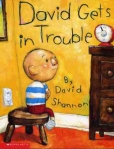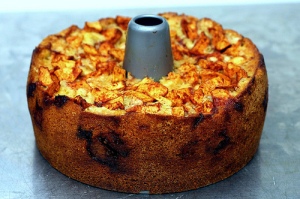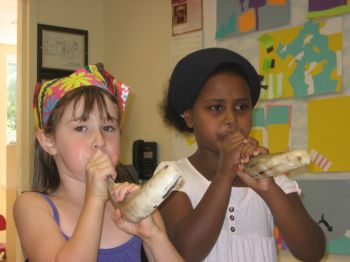reprinted from the PJ Library newsletter, September 2008
 This past month, my daughter Ella received a copy of The Hardest Word from the PJ Library. In this story, a giant mythical bird called the Ziz accidentally destroys a vegetable garden belonging to a group of children. Unable to fix his mistake, the Ziz flies to Mt. Sinai to ask God what he should do. God sends the Ziz on a mission, to search the world for the hardest word to say. That word turns out to be “sorry.”
This past month, my daughter Ella received a copy of The Hardest Word from the PJ Library. In this story, a giant mythical bird called the Ziz accidentally destroys a vegetable garden belonging to a group of children. Unable to fix his mistake, the Ziz flies to Mt. Sinai to ask God what he should do. God sends the Ziz on a mission, to search the world for the hardest word to say. That word turns out to be “sorry.”
When I read the story to Ella, she was puzzled. “‘Sorry’ isn’t hard to say,” she explained. “See, I just said it!” (Five year olds have a tendency to be rather literal.) The word “sorry” does get bandied about by my daughters with some frequency. Sometimes it’s volunteered, and these are the moments that make my heart ache with tenderness for my sweet little girls. But more often, it follows the command “Tell your sister you’re sorry” or “If you don’t say you’re sorry…(insert one of a myriad of consequences here.) In these cases, I hear one of several lesser versions of sorry, and these are the moments that make my head ache.
There’s the “sorry” growled between clenched teeth. Or, the more elaborate but equally remorseless, “Sorry, but I didn’t do anything and anyway she started it.” Or, the painfully honest “I SAID ‘Sorry’. Now can I watch a show?” In other words, Ella is right. Sorry isn’t hard to say. Sorry is hard to mean.
With the High Holidays approaching, I’ve been thinking a lot about how to introduce the concept of teshuvah, or repentance, to my children in a meaningful and developmentally appropriate way. According to tradition (or at least Aish.com’s explanation of tradition), the Medieval scholar Maimonides outlined four steps to doing teshuvah.
Step 1. Stop the offending action.
Step 2. Feel regret for what you’ve done.
Step 3. Verbalize your regret to the appropriate party.
Step 4. Come up with a plan for not repeating the mistake.
I think what was confusing about “The Hardest Word”, at least for my children, was that the Ziz felt sorry from the moment he accidentally destroyed the garden. This story was focused on step 3, articulating your regret, and frankly, we’re just not there yet. We’re still working on Step 2, feeling regret, because as every parent knows, without regret, an apology rings hollow, at best.
I’m not sure it’s possible to teach regret. I’m not even sure at what age children are capable of this kind of self-reflection. But I do think we can teach children to own up to their actions, a necessary precursor to actual regret. And if, like me, you’re looking for a book that does a brilliant job of teaching this aspect of Teshuvah, check out David Gets in Trouble, by David Shannon. No, it’s not a Jewish book, but what Jewish child wouldn’t identify with the impish star of No, David as he denies his way through page after page of mischief? “No, it’s not my fault!” he shouts, followed by “It was an accident!” and “But she likes it!” After exhausting his excuses, David wakes up in the middle of the night, awash with guilt. And prompted by no one – not Mom, not Dad, not God – he announces aloud “Yes! It was me! I’m sorry. I love you, Mom.”
I’m sure David Shannon never intended his book to be a lesson on teshuvah, but don’t you think Maimonides would approve?
More from Beliefnet and our partners

